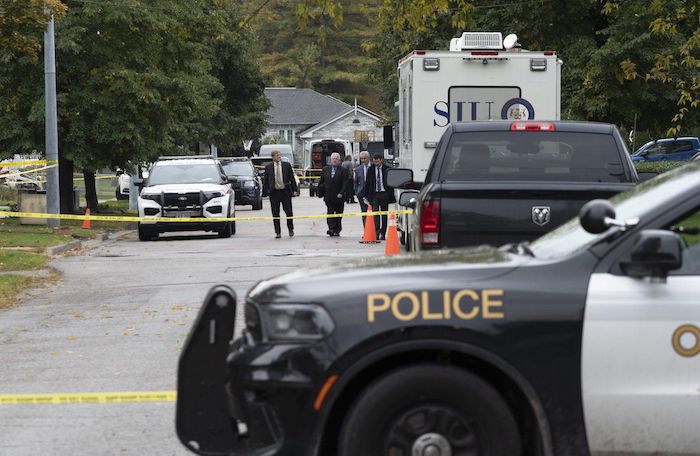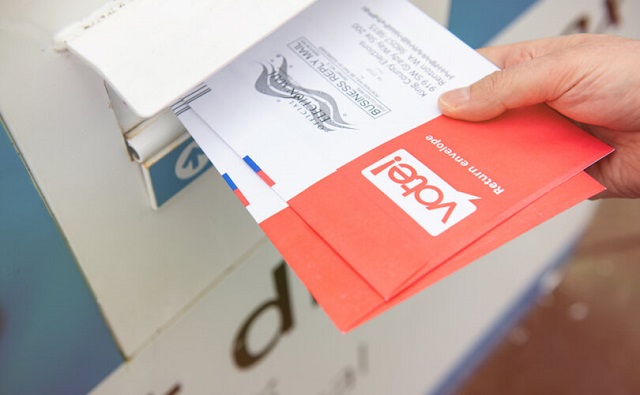Crime
Ontario police officers did not draw firearms before they were fatally shot: watchdog

By Holly McKenzie-Sutter
Two police officers who died responding to a call at an Innisfil, Ont., home did not draw their firearms before they were shot, Ontario’s police watchdog said Thursday, as grieving friends and colleagues remembered the two men as kind and dedicated.
The Special Investigations Unit had said a day earlier that there was an “exchange of gunfire” Tuesday night between the two officers and a 23-year-old man, who also died in the shooting.
New details emerged from the agency on Thursday, including that a third officer had been at the home.
“Based on preliminary information, the two officers did not draw their firearms when they were fatally shot,” Special Investigations Unit spokeswoman Kristy Denette said in a written statement.
“A third officer who was also at the house exchanged gunfire with the man.”
The South Simcoe Police Service has identified the officers who died as Const. Devon Northrup, 33, and Const. Morgan Russell, 54. The third officer, who hasn’t been named, was not injured, Denette said.
The SIU, which is still investigating, said the three officers were responding to a call from a family member about a disturbance at a home.
The 23-year-old man, who lived at the home, had a gun that the SIU said was a SKS semi-automatic rifle. An autopsy on the man is set for Friday, the SIU said.
The SIU did not name the young man but a source close to the investigation identified him as Chris Doncaster.
Court records show that a Chris Doncaster was charged with mischief under $5,000 in October 2018 and two failures to appear in court. All three charges were withdrawn in June of the following year.
The Department of National Defence confirmed Thursday that a man named Christopher Joseph Doncaster was a Canadian Armed Forces member from May to December 2020.
“He was a private with no deployment history and who did not complete basic training,” the department said.
An Instagram account that uses the name Chris Doncaster featured a photo posted over a year ago that appeared to depict a young man posing on a South Simcoe Police Service jet ski.
Residents who live in the area have expressed shock at what happened. Some said an elderly couple who had an adult grandson lived in the house where the shooting took place.
South Simcoe police said words cannot describe the grief the force is experiencing.
Northrup, a six-year member of the South Simcoe Police Service, worked with the community mobilization and engagement unit, and also served as a member of the mental health crisis outreach team and the emergency response unit. He is survived by his partner and parents, police said.
In 2020, Northrup was given an Excellence in Emergency award by the force for his role in helping a person in crisis.
“The officers can take comfort in knowing they saved this man’s life that day,” an annual report by the police force read.
Russell, a father of two, was a 33-year veteran of the force. He was a trained crisis negotiator and was assigned to uniform patrol, the police service said.
Condolences and memories of the two officers continued to pour in on Thursday.
Flowers were seen placed outside South Simcoe Police’s Innisfil detachment, and a community vigil drew mourners together Wednesday night as the officers were remembered.
“From the flowers and food being dropped off at our stations, to last night’s packed candlelight vigil, to Innisfil Beach Park lit up in blue, to the book of condolence in Bradford, for all the posts and notes of condolence – thank you,” South Simcoe Police tweeted on Thursday afternoon.
Mothers Against Drunk Driving expressed sadness over Northrup’s passing, saying he was “played a pivotal role” at the organization’s York Region Chapter, where he worked as a former treasurer and director at large.
“Devon was a gentle giant with a smile that would light up a room; he will be truly missed,” MADD York Region said in a Facebook post.
Georgian College said in a statement that the school community was “saddened” about the loss of Russell, who graduated from the Law and Security program in 1988.
College president Kevin Weaver shared condolences for Northrup and said flags would be lowered at Barrie and Orillia campuses in their memory.
This report by The Canadian Press was first published Oct. 13, 2022.
Addictions
Why can’t we just say no?

From the Frontier Centre for Public Policy
Drug use and violence have become common place in hospitals. Drug-addicted patients openly smoke meth and fentanyl, and inject heroin. Dealers traffic illicit drugs. Nurses are harassed, forced to work amidst the toxic fumes from drugs and can’t confiscate weapons. In short, according to one nurse, “We’ve absolutely lost control.”
“Defining deviancy down” is a cultural philosophy that emerged in the United States during the 1990s.
It refers to society’s tendency to adjust its standards of deviancy “down,” so that behaviours which were once unacceptable become acceptable. Over time, this newly- acceptable behaviour can even become society’s norm.
Of course, the converse must also be true — society looks down on those who label social behaviours “wrong,” deeming them moralistic, judgemental or simply out of touch with the realities of modern life.
Thirty years later, this philosophy is entrenched in British Columbia politics and policies. The province has become a society that cannot say “no” to harmful or wrong behaviours related to drug use. It doesn’t matter if you view drug use as a medical issue, a law-and-order issue, or both – we have lost the ability to simply say “no” to harmful or wrong behaviour.
That much has become abundantly clear over the past two weeks as evidence mounts that BC’s experiment with decriminalization and safe supply of hard drugs is only making things worse.
A recently-leaked memo from BC’s Northern Health Authority shows the deleterious impact these measures have had on BC’s hospitals.
The memo instructs staff at the region’s hospitals to tolerate and not intervene with illegal drug use by patients. Apparently, staff should not be taking away any drugs or personal items like a knife or other weapons under four inches long. Staff cannot restrict visitors even if they are openly bringing illicit drugs into the hospital and conducting their drug transactions in the hallways.
The public was quite rightly outraged at the news and BC’s Health Minister Adrian Dix quickly attempted to contain the mess by saying that the memo was outdated and poorly worded.
But his facile excuses were quickly exposed by publication of the very clearly worded memo and by nurses from across the province who came forward to tell their stories of what is really happening in our hospitals.
The President of the BC Nurses Union, Adriane Gear, said the issue was “widespread” and “of significant magnitude.” She commented that the problems in hospitals spiked once the province decriminalized drugs. In a telling quote, she said, “Before there would be behaviours that just wouldn’t be tolerated, whereas now, because of decriminalization, it is being tolerated.”
Other nurses said the problem wasn’t limited to the Northern Health Authority. They came forward (both anonymously and openly) to say that drug use and violence have become common place in hospitals. Drug-addicted patients openly smoke meth and fentanyl, and inject heroin. Dealers traffic illicit drugs. Nurses are harassed, forced to work amidst the toxic fumes from drugs and can’t confiscate weapons. In short, according to one nurse, “We’ve absolutely lost control.”
People think that drug policies have no impact on those outside of drug circles – but what about those who have to share a room with a drug-smoking patient?
No wonder healthcare workers are demoralized and leaving in droves. Maybe it isn’t just related to the chaos of Covid.
The shibboleth of decriminalization faced further damage when Fiona Wilson, the deputy chief of Vancouver’s Police Department, testified before a federal Parliamentary committee to say that the policy has been a failure. There have been more negative impacts than positive, and no decreases in overdose deaths or the overdose rate. (If such data emerged from any other healthcare experiment, it would immediately be shut down).
Wison also confirmed that safe supply drugs are being re-directed to illegal markets and now account for 50% of safe supply drugs that are seized. Her words echoed those of BC’s nurses when she told the committee that the police, “have absolutely no authority to address the problem of drug use.”
Once Premier David Eby and Health Minister Adrian Dix stopped denying that drug use was occurring in hospitals, they continued their laissez-faire approach to illegal drugs with a plan to create “safe consumption sites” at hospitals. When that lacked public appeal, Mr. Dix said the province would establish a task force to study the issue.
What exactly needs to be studied?
The NDP government appears to be uninformed, at best, and dishonest, at worst. It has backed itself into a corner and is now taking frantic and even ludicrous steps to legitimize its experimental policy of decriminalization. The realities that show it is not working and is creating harm towards others and toward institutions that should be a haven for healing.
How quickly we have become a society that lacks the moral will – and the moral credibility – to just to say “no.”
Susan Martinuk is a Senior Fellow with the Frontier Centre for Public Policy and author of Patients at Risk: Exposing Canada’s Health-care Crisis.
Alberta
Former senior financial advisor charged with embezzling millions from Red Deer area residents

News release from Alberta RCMP
Former senior financial advisor charged for misappropriating nearly $5 million from clients
On April 4, 2024, the RCMP’s Provincial Financial Crime Team charged a Calgary resident for fraud-related offences after embezzling millions of dollars from his clients while serving as a senior financial advisor.
Following a thorough investigation, the accused is alleged to have fraudulently withdrawn funds from client accounts and deposited them into bank accounts he personally controlled. A total of sixteen victims were identified in the Red Deer area and suffered a combined loss of nearly $5 million.
Marc St. Pierre, 52, a resident of Calgary, was arrested and charged with:
- Fraud over $5,000 contrary to section 380(1)(a) of the Criminal Code; and,
- Theft over $5,000 contrary to section 344(a) of the Criminal Code.
St. Pierre is scheduled to appear in Red Deer Provincial Court on May 14, 2024.
“The ability for financial advisors to leverage their position to conduct frauds and investment scams represents a significant risk to the integrity of Alberta’s financial institutions. The investigation serves as an important reminder for all banking clients to regularly check their accounts for any suspicious activity and to report it to their bank’s fraud prevention team.”
- Sgt. John Lamming, Provincial Financial Crime Team
The Provincial Financial Crime Team is a specialized unit that conducts investigations relating to multi-jurisdictional serious fraud, investments scams and corruption.
-

 espionage2 days ago
espionage2 days agoOne in five mail-in voters admitted to committing voter fraud during 2020 election: Rasmussen poll
-

 Business2 days ago
Business2 days agoHonda deal latest episode of corporate welfare in Ontario
-

 Automotive1 day ago
Automotive1 day agoThe EV ‘Bloodbath’ Arrives Early
-

 Brownstone Institute24 hours ago
Brownstone Institute24 hours agoThe Numbers Favour Our Side
-

 Frontier Centre for Public Policy20 hours ago
Frontier Centre for Public Policy20 hours agoHow much do today’s immigrants help Canada?
-

 CBDC Central Bank Digital Currency1 day ago
CBDC Central Bank Digital Currency1 day agoA Fed-Controlled Digital Dollar Could Mean The End Of Freedom








